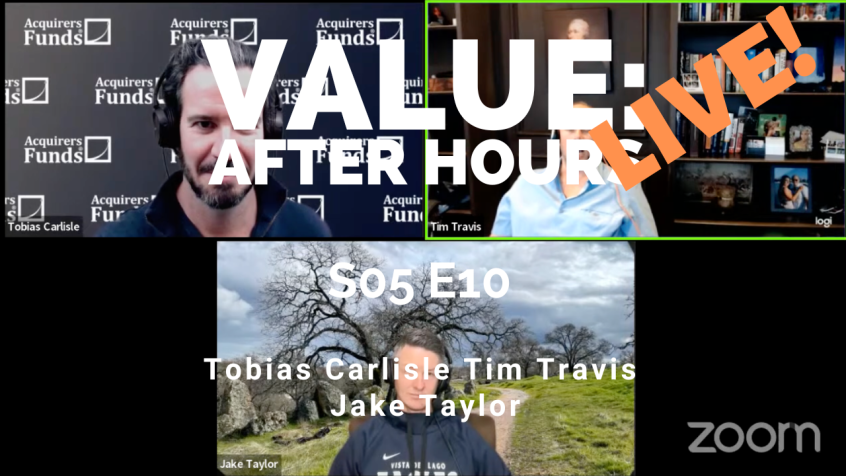During their latest episode of the VALUE: After Hours Podcast, Travis, Taylor, and Carlisle discuss SVB – A 1980s Style Bank Run With A Modern Twist. Here’s an excerpt from the episode:
Tobias: Do you guys understand what happened with Silicon Valley Bank? Jake’s going to tell us what a bank is and then Tim’s going to tell us what happened with Silicon Valley Bank. What’s a bank?
Jake: Well, in the most basic version of it, it’s an institution that takes money in usually on shorter-term basis, lends it on a longer-term basis, and collects the net interest margin difference between those two, and calls that earnings, and then grows from there.
Tobias: Are you not allowed to call it–? Why is it not earnings?
Jake: Oh, it’s earnings. I’m being a little glib.
Tobias: The little regional banks make a lot more of their money from loans than the big banks do. They’re much more dependent on loans. The big banks have lots of other lines of service. They make money lots of different ways. Little banks make money-
Jake: Yeah, wealth management.
Tobias: -mostly on loans. Yeah.
Tim: Yeah, that’s true. A lot of people underestimate the diversification of the larger banks. You see them do pretty well in just about any environment, when volatility is spiking. I’m sure that big investment banks are printing money with the volatility we’ve seen over the last week. Then obviously, you’re right. The regionals are more net interest income oriented. But, yeah, I’d be happy to start on the Silicon Valley Bank. Really a classic 1980s style bank run with a modern twist. If you look at their deposit base, the growth was extraordinary. I think it was like 81% last year. I could be wrong on that. It was up a lot the year before too. The depositors were predominantly venture capital funds, VC companies, and a lot of those are burning cash. And so, they’re needing access to funds for payroll and whatnot.
The management of Silicon Valley Bank, instead of understanding the sensitivity there, it seems like they invested in longer duration securities to benefit, and they did it. The timing was bad. They got so many deposits when interest rates were so low that they took way too much risk on that and didn’t hedge appropriately.
Tobias: Before you move on there– [crosstalk]
Jake: Yeah, sure.
Tobias: This is worth diving into because what they’ve done is they’ve stuck most of it into Treasuries right?
Tim: Treasuries. Yeah.
Jake: And mortgage-backed securities.
Tim: MBS.
Tobias: Okay.
Tim: Yeah.
Tobias: What’s hurt them though? Is it the Treasuries or the MBS that hurt them, or both? Potentially, I guess.
Tim: Oh, both. Both would trade at a– If you’re doing a mortgage at 2.15%, 2.5% on a 30 year per se, that mortgage would be trading at a pretty big discount right now. So, both of those hurt them. And we’ve seen that in most of the insurance companies and the banks. You’ve seen book values decline unless there’s something aberrational where they’re able to buy back stock at a discount or something like that. So, that part of it’s normal. But what really got Silicon Valley Bank was what seems almost a coordinated bank run. You have depositors, in this case, pretty large VC funds and companies, and they’re able to communicate and say, “Hey, we’re pulling our money out. Maybe you should too.” With technology nowadays– That can affect any bank, of course, but especially Silicon Valley Bank, it seems almost like it was a coordinated bank run. [crosstalk]
Tobias: To what end? To make a short payoff?
Tim: That’s a good question. Realistically, that’s a question that should being asked. So, I’d be curious who’s buying credit default swaps on that bank and other banks, or buying puts or shorting the stocks, because it seems a lot like a coordinated bank run. I don’t know what would have prompted that so fast. I have no interest in Silicon Valley Bank. I’ve never used them. I’ve never owned the stock, neither with the other ones, the signature or silver gate. [crosstalk] Yeah, but bank runs just like Jake was saying, anyone would be susceptible to a bank run. I think that people need to focus on what prompted that in the first place.
You can find out more about the VALUE: After Hours Podcast here – VALUE: After Hours Podcast. You can also listen to the podcast on your favorite podcast platforms here:
For all the latest news and podcasts, join our free newsletter here.
Don’t forget to check out our FREE Large Cap 1000 – Stock Screener, here at The Acquirer’s Multiple:



